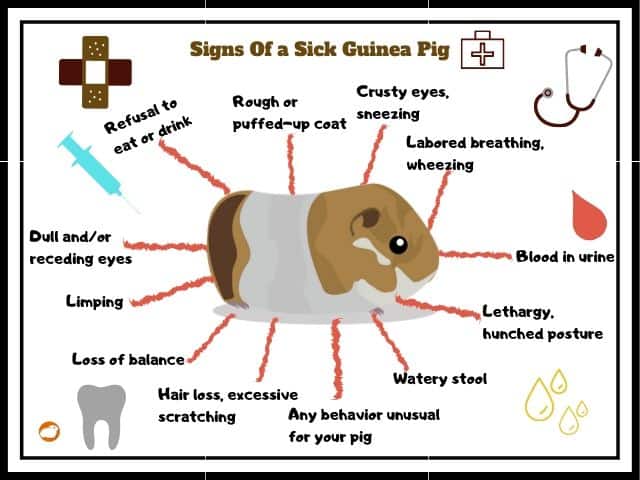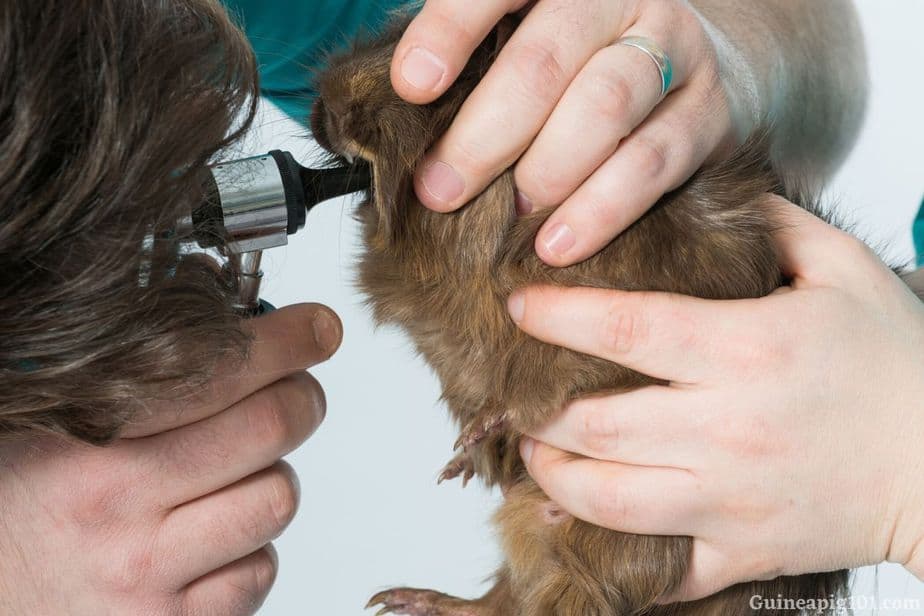To say that a guinea pig is suffering from some illness is not easy to conclude, we need to check for any sudden change in temperature. It is a matter of concern if a guinea pig has cold ears. Many guinea pig owners often ask us why are my guinea pig’s ears cold.
So, I decided to do some research and here is what I have learned.
Ears play a vital role in managing the body temperature of guinea pigs. The ears are cold when they are warming their body, especially during winter or windy conditions. Cold ears, along with other symptoms like weakness and loss of appetite, is a warning sign of an illness.
Usually, a drop in body temperature is indicated by cold ears, but when there are other symptoms, it is time to visit a veterinary doctor.
Very cold ears are a warning sign of a sudden drop in body temperature. It can be a severe illness and may require immediate medical assistance. Else it is not a matter of concern on regular days.
Why are my guinea pig’s ears so cold?
The reduction of heat loss from the guinea pig’s body surface is an adaptive measure during cold conditions.
Guinea pigs do not shiver to warm up during winter. They regulate the body temperature with the help of ears.
They curl up their ears to reduce the surface area and bring down its temperature compared to other body parts to minimize heat loss from different body parts.
Temperature regulation in guinea pigs
The average body temperature should be in the range of 102 to 104 degrees Fahrenheit.
The environmental temperature range that guinea pigs feel cozy to stay is 65 to 75 degrees Fahrenheit. In this temperature range, their metabolic rate is fast, and they remain fit.
Guinea pigs manage with the cold weather in the following ways:
- Ears: Heat is produced by all parts of the body of guinea pigs. There is an extensive network of blood vessels surrounding the ears, which helps in the exchange of heat. During cold conditions, guinea pigs can preserve the body heat by cooling their ears and minimizing the heat loss to the environment.
- Breathing: The slower they breathe, the warmer they keep themselves. Guinea pigs reduce the breathing pace to trap body heat as most of the heat is produced by evaporation of water while breathing.
- Behavior: Guinea pigs curl up their body during icy conditions. This further helps to reduce the loss of heat, as lower surface area exposed to the environment minimizes the exchange of heat with the situation.
Are guinea pig’s ear supposed to be cold
Under normal circumstances, the ears are cold, if the temperature outside is more relaxed than the body temperature of guinea pigs.
One can compare the ears with car radiators for the functioning of temperature regulators.
Guinea pigs maintain the body temperature by managing the blood flow to the ear lobe from different parts of the body.
Ear lobes of guinea pigs are richly supplied with blood vessels, which are constricted or dilated according to the weather.
When there is a temperature drop, the blood supply to the ear lobes is reduced by contraction of blood vessels.
Guinea pigs can survive winter when compared to summer.
Large ears have little or no furs on both sides, which helps in body temperature control.
When the weather conditions are cold, the guinea pigs curl up their outer ears and bring them close to the body. That helps to retain body heat and minimize heat loss.
The ears having a lower temperature than the surrounding helps to absorb heat from the surrounding. They are thus maintaining the body temperature at the optimum level of 102 – 104 degrees Fahrenheit.
When are cold guinea pig’s ear a cause for concern
Guinea pigs having cold ears, along with other symptoms, is a matter of concern for guinea pigs. Only cold ears are a common thing found in guinea pigs.
Guinea pigs are likely to fall sick when they are in contact with germs or consume contaminated food, just like any other animal. There can be genetic disorders, which can be the reason for illness.
Guinea pigs have a habit of hiding the disease as this weakness can give an extra edge to the predators. This instinct of not disclosing the illness is also found in the domestic guinea pigs.
The pet owners might be unaware of the sickness of their guinea pigs and are unable to get any medical care for them.
So, one needs to keep watch on all the changes in the behavioral and physical changes in the activities of the guinea pig.
If Guinea pigs have cold ears then check for other symptoms. Below are common symptoms found in guinea pigs when they are suffering due to any illness.
Signs of a sick guinea pig

| Symptoms | What it means | Effect on guinea pigs |
|---|---|---|
| Lethargy | Common sign for multiple sickness | – Not involved in playing activities – Do not move around the cage – Not greeting you as usual – Overall less active – Not eating properly |
| Teeth grinding | – Suffering due to pain – Annoyance due to some reason | – It is not the usual noise. – Lethargy and hiding |
| Runny nose, sneezing and unable to breathe properly | – Allergic to something – Common Cold – Respiratory Infection – Dehydration | – Common effects like in human beings |
| Drooling of saliva or difficulty in eating | – Dental Infection – Malocclusion | – Inability to eat hard food – Loss in appetite – Overgrown Molars |
| Tilted Neck | Ear infection | – Unable to body balance – Tilted neck – Refer to veterinary immediately |
| Unusual faeces | – Stomach Infection – Dental Infection – Unusual diet – Digestive tract disorder | – Watery bowels – Unusual colour, shape and size – Covered with mucus – Hair found in the feces |
Guinea pigs have cold ear after being spayed
Body temperature drops when an animal is treated with anaesthesia.
Regular monitoring of the body temperature is required during the treatment and recovery. To prevent the animals from hypothermia, they are kept warm with some heating substance during any surgery.
So it is evident for any guinea pigs to feel cold after being spayed. Care should be taken to keep them warmer after the surgery.
Cold ears of guinea pigs indicate their low body temperature, but ears do not show the specific level of body temperature. Take care of your guinea pigs when the ears are too cold, as it may lead to hypothermia or passing away in some cases.
How to check a guinea pig’s temperature?
The average body temperature of guinea pigs should be within the range of 102 to 104 degrees Fahrenheit. But measuring the body temperature of guinea pigs is a cumbersome task and even makes them ill.
So care should be taken to avoid regular measurement of body temperature.
One should learn how to measure the temperature of guinea pigs from an experienced person or a veterinarian beforehand.
It is advised to use a rubber tip thermometer to avoid any accidental breakage of the thermometer inside the body of the guinea pig.
The steps to be followed to measure guinea pig’s temperature.
- Place the guinea pig on its back, on your lap or a soft padded top.
- Its position should be such that the thermometer can travel smoothly through the rectum.
- The head and shoulder should be against your abdomen, and its body is curled.
- The rectum path should be in a straight line along the lower spine, with its footpads facing the ceiling.
- The guinea pig often kicks and hurts itself. To avoid such conditions, make sure the back legs are safely placed.
- Insert the lubricated rubber tip thermometer up to 1 inch. That is done only when the guinea pig is in a relaxed state.
- The anus should be adequately located before insertion.
- It is just below the tail, behind the urogenital opening.
- The anus will move inwards when you touch it with the thermometer.
Don’t stress your guinea pig
Make your guinea pig feel comfortable by talking to it continuously. One should adequately hold a guinea pig so that it doesn’t jump, kick or hurt itself.
If the guinea pig feels uncomfortable, place it on its belly position, and support its back gently. Do not overstress your guinea pig; try again when it feels relaxed. Still, if you are unable to do, then think of taking it to your veterinarian.
Never try hard to measure the temperature as the inner part of the rectum and colon is very delicate and soft. These parts are highly susceptible to be damaged. Instead, try to change the position.
Considerations
It is often discussed that while measuring temperature placing the guinea pig on its back can be harmful to your pet.
As the guinea pig is already under some stress and must be having poor blood circulation, placing it on its back can be fatal. You may better take it to a veterinarian, as they are trained to handle such situations.
Keep a watch on the ear’s temperature. It should not be too hot or cold. If There is abnormal temperature, along with other symptoms, then don’t ignore it.
Although the ear’s temperature does not specify the exact body temperature, ear temperature coupled with other symptoms gives an idea of any uneasiness of the guinea pig.
There is another to measure the temperature, wrap the guinea pig in a towel or small blanket in a manner that only it back is hanging out. Place it on the edge of a table so that its temperature can be measured from below.
It is good to take the help of another person in this step, where you hold your pet, and the other person can do the job of measuring the temperature.
Guinea pig has cold ears and isn’t eating
Guinea pigs like to chew anything and everything. Unlike other animals like dogs and cats, if a guinea pig refuses to eat, it signifies some emergency. Consult a vet if a guinea pig is not having food and have cold ears.
Ileus is a gastrointestinal disorder that commonly causes the loss of appetite of guinea pigs.
When the guinea pigs are unable to push the food along the digestive tract, this situation arises due to their inability to do peristaltic movement in the intestines. Ileus is a severe problem and can be fatal if they are not treated.
Cause of ileus in guinea pigs

Ileus is caused due to many reasons. Few among them are:
- Enlarged teeth
- Dental infection
- Accumulation of pus in any part of body
- Neural disorder, like E. Cuniculi
- Parasitic infection in intestines
- External parasitic infection
- Sore hocks or Pododermatitis
- Gastric ulcers
- Osteoarthritis
- Environment changes and stress
- Respiratory Infection
- Tumors
- Poisoning
- Organ failure or malfunctioning
- Infectious Disease
Ileus signs and symptoms in guinea pigs
One should look for the following symptoms to confirm whether it is suffering from ileus when the guinea pig refuses to eat:
- Abnormal growth of front teeth. Easily noticeable, lift the lips.
- Tumors or pus formation. Check for any pus accumulation or lump formation.
- Running nose or eyes. It is easily recognized as the guinea pig often uses its front paw to clean the face. So check whether the front paw is dirty from the nasal release.
Check the nasal drainage is forming condensation by bringing a mirror in front of the nose.
Often it is not clear whether guinea pigs are refusing to eat. In such cases, when you cannot confirm the abnormal eating habits, check for the following:
- Any change in the composition of feces, like watery, sticky, etc.
- Reduced poop or no poop at all.
- Change in the shape, size of feces
- Loss in weight
- Not eating its favorite dish
- Teeth grinding
- Reduced activity or being lethargic
- Leaving behind the food uneaten and gradual increase in it.
Ileus Home care
Sometimes environmental changes also cause stress to the guinea pigs. Revert the same conditions and give the food of their choice.
It becomes necessary to visit a veterinarian, if the guinea pig is not having food even for a day, it might be in a critical condition and may end up losing its life. Home treatment is advisable only when it is not having food for a few hours.
You should consult your veterinarian over the phone before giving any home treatment to your guinea pig.
The following steps are followed for home treatment:
- Mixed veggie baby food: You need to push the food into the guinea pig, consider using a syringe if necessary to stimulate the gastrointestinal tract. As the absence of peristaltic movement in the intestines for more extended periods can cause the formation of gas. That may cause severe pain.
- Massage and exercise: After feeding the guinea pig, massage their belly to stimulate the gastrointestinal movement. Use is also recommended.
- Increased water intake: Provide the guinea pig with clean water to drink in a bowl. You can also feed the water through a syringe or give it wet vegetables. An electrolyte solution is also considered beneficial for the guinea pig.
- Diet: Check whether the guinea pig is eating food, even though in small quantities. If yes, then provide it with food having a high content of water and fiber-like lettuce and celery. Adding good quality, hay, is also good for the stomach. Pellets should be avoided.
Visit your veterinarian if the guinea pig is still avoiding food.
Ileus Diagnostics and treatment
Standard treatment procedures include fluids or other forms of hydration provided to the guinea pigs. Apart from this, medication is given for pain and gas production.
The guinea pigs are force feed with veterinary grade products. That will give appropriate nutrition to become healthy and regulate body functions.
Determination of the cause of the loss of diet is necessary. Apart from the physical examination, your veterinarian may request a few regular tests like urine tests, blood tests, fecal tests, dental examination, etc. These tests are performed because appetite loss can be caused by multiple reasons.
Sometimes due to poor health conditions of the guinea pig or limited finances tests cannot be performed.
Then increased treatment with fluids and medication is done to overcome the illness. But the problem occurs again as the cause may persist in the body.
How to prevent loss of appetite in guinea pigs

Prevention is better than cure. A healthy ambiance like a clean and hygienic cage reduces the chance of parasitic infection. They are controlling the growth of teeth by proper dental care.
Guinea pigs should be given substantial pure drinking water, along with leafy vegetables and hays. That helps to increase the diet of the guinea pig.
Reducing the stress by the right environment, controlled temperature, and other factors are beneficial for the guinea pig.
Conclusion:
Guinea pigs need regular monitoring of their health. They are very sensitive to change in the environment.
Although they adapt to colder conditions by lowering the ears’ temperature, cold ears should not be ignored.
Cold ears, accompanied by other symptoms, indicate some uneasiness with guinea pigs. Such a condition needs immediate medical attention. Ignorance of such events can be fatal for the guinea pigs.
Regular examination of the body temperature is helpful to identify the illness. The measurement of body temperature needs a skillful approach as guinea pigs may hurt themselves in the process.
The medication involves the diagnosis and treatment of the disease. The cause of the illness should also be a matter of concern, to avoid repetition of such events.
Guinea pigs should not be put under stress, as it may also be the cause of illness.
The environment should be comfortable, and their living place needs to be hygienic. They are highly susceptible to hot conditions. Take care that they are not exposed to warm weather.
Guinea pigs may be suffering from some gastrointestinal disorder, which might lead to loss of appetite.
So, whenever there is a loss of appetite, check their body temperature and other symptoms. Refer to your veterinarian if the condition doesn’t improve.
Sources: Structural changes in the inner ear of guinea pig, Management of Ileus in Guinea Pigs, Diseases in pet guinea pigs, Anesthesia Guidelines: Guinea Pig
